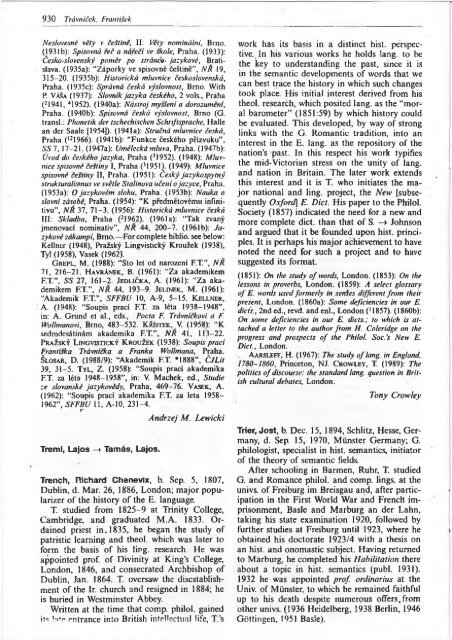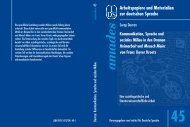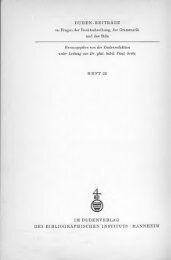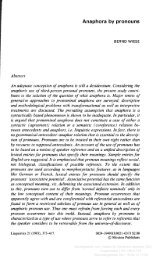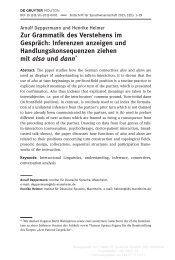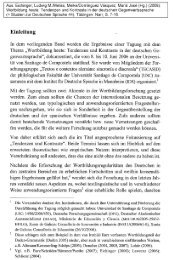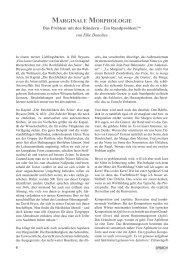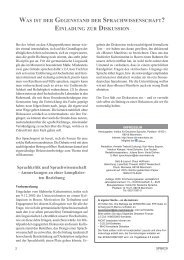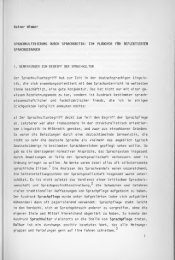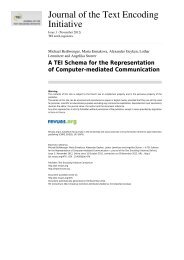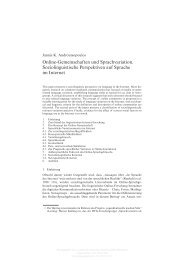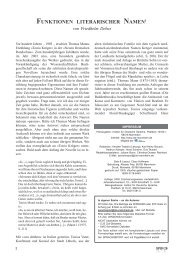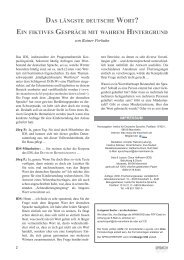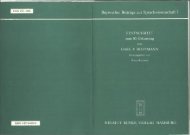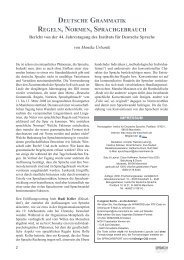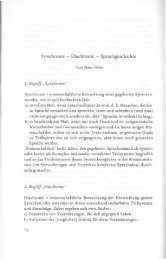Create successful ePaper yourself
Turn your PDF publications into a flip-book with our unique Google optimized e-Paper software.
930 Trdvniöek, Frantisek<br />
Neslovesne vety v cestine, II: Vety nomindlni, Brno.<br />
(1931b): Spisovnd ree a nareci ve skole, Praha. (1933):<br />
Cesko-slovensky pomer po straw*■jazykove, Bratislava.<br />
(1935a): “Zaporky ve spisovne cestine”, NR 19,<br />
315-20. (1935b): Historickd mluvnice ceskoslovenskd,<br />
Praha. (1935c): Sprdvnd ceskd vyslovnost, Brno. With<br />
P. VAsa (1937): Slovnik jazyka eeskeho, 2 vols., Praha<br />
(21941, 41952). (1940a): Ndstroj mysleni a dorozumenl,<br />
Praha. (1940b): Spisovnd ceskd vyslovnost, Brno (G.<br />
transl.: Phonetik der tschechischen Schriftsprache, Halle<br />
an der Saale [1954]). (1941a): Strucnd mluvnice ceskd,<br />
Praha (l2l 966). (1941b): “Funkce eeskeho pfizvuku”,<br />
SS 7, 17-21. (1947a): Umeleckd mluva, Praha. (1947b):<br />
Üvod do eeskeho jazyka, Praha (31952). (1948): Mluvnice<br />
spisovne cestiny I, Praha (31951^. (1949): Mluvnice<br />
spisovne cestiny II, Praha. (1951): Cesky jazykospytnv<br />
Strukturalismus ve svetle Stalinova uceni o jazyce, Praha.<br />
(1953a): O jazykovim slohu, Praha. (1953b): Nauka o<br />
slovni zdsobe, Praha. (1954): “K predmetov6mu infinitivu”,<br />
NR 37, 71-3. (1956): Historickd mluvnice ceskd<br />
III: Skladba, Praha (21962). (1961a): “Tak zvany<br />
jmenovaci nominativ”, NR 44, 200-7. (1961b): Ja <br />
zykove zakampi, Brno.— For complete biblio. see below:<br />
Kellner (1948), Prazsky Lingvisticky Krouzek (1938),<br />
Tyl (1958), Vasek (1962).<br />
G r e p l , M. (1988): “Sto let od narozeni F.T.”, NR<br />
71, 216-21. H a v rAn e k , B. (1961): “Za akademikem<br />
F.T.”, S S 27, 161-2. J e d l ic k a , A. (1961): “Za akademikem<br />
F.T.”, NR 44, 193-9. J e l in e k , M. (1961):<br />
“Akademik F.T.”, SFFB U 10, A-9, 5-15. K e l l n e r ,<br />
A. (1948): “Soupis praci F.T. za leta 1938-1948”,<br />
in: A. Gnmd et al., eds., Pocta F. Travnickovi ä F.<br />
Wollmanovi, Brno, 483-532. K r Is t e k , V. (1958): “ K<br />
sedmdesätinäm akademika F.T.”, NR 41, 113-22.<br />
P r a z s k y L in g v is t ic k y K r o u z e k (1938): Soupis praci<br />
Frantiska Trdvnlcka a Franko Wollmana, Praha.<br />
S l o s a r , D. (1988/9): “Akademik F.T. *1888”, CJLit<br />
39, 31-5. T y l , Z. (1958): “Soupis praci akademika<br />
F.T. za leta 1948-1958”, in: V. Machek, ed., Studie<br />
ze slovanski jazykovedy, Praha, 469-76. V a s e k , A.<br />
(1962): “Soupis praci akademika F.T. za leta 1958—<br />
1962”, SFFB U 11, A-10, 231-4.<br />
. r'<br />
Andrzej M. Lewicki<br />
Treml, Lajos —>Tamäs, Lajos.<br />
Trench, Richard Chenevix, b. Sep. 5, 1807,<br />
Dublin, d. Mar. 26, 1886, London; major popularizer<br />
of the history of the E. language.<br />
T. studied from 1825-9 at Trinity College,<br />
Cambridge, and graduated M.A. 1833. Ordained<br />
priest in. 1835, he began the study of<br />
patristic learning and theol. which was later to<br />
form the basis of his ling, research. He was<br />
appointed prof. of Divinity at King’s College,<br />
London, 1846, and consecrated Archbishop of<br />
Dublin, Jan. 1864. T. oversaw the disestablishment<br />
of the Ir. church and resigned in 1884; he<br />
is buried in Westminster Abbey.<br />
Written at the time that comp, philol. gained<br />
its Lite entrance into British intellectual life, T.’s<br />
work has its basis in a distinct hist, perspective.<br />
In his various works he holds lang. to be<br />
the key to understanding the past, since it is<br />
in the semantic developments of words that we<br />
can best trace the history in which such changes<br />
took place. His initial interest derived from his<br />
theol. research, which posited lang. as the “moral<br />
barometer” (1851:59) by which history could<br />
be evaluated. This developed, by way of strong<br />
links with the G. Romantic tradition, into an<br />
interest in the E. lang. as the repository of the<br />
nation’s past. In this respect his work typifies<br />
the mid-Victorian stress on the unity of lang.<br />
and nation in Britain. The later work extends<br />
this interest and it is T. who initiates the major<br />
national and ling, project, the New [subsequently<br />
Oxford\ E. Diet. His paper to the Philol.<br />
Society (1857) indicated the need for a new and<br />
more complete diet, than that of S. —> Johnson<br />
and argued that it be founded upon hist, principles.<br />
It is perhaps his major achievement to have<br />
noted the need for such a project and to have<br />
suggested its format.<br />
(1851): On the study o f words, London. (1853): On the<br />
lessons in proverbs, London. (1859): A select glossary<br />
o f E. words used formerly ,n senies different from their<br />
present, London. (1860a): Some deficiencies in our E.<br />
diets., 2nd ed., revd. and enl., London ( ’ 1857). (1860b):<br />
On some deficiencies in our E. diets.; to which is attached<br />
a letter to the author from H. Coleridge on the<br />
progress and prospects o f the Philol. Soc.'s New E.<br />
Diet., London.<br />
A a r s l e f f , H. (1967): The study o f lang. in England,<br />
1780-1860, Princeton, NJ. C r o w l e y , T. (1989): The<br />
politics o f discourse: the standard lang. question in British<br />
cultural debates, London.<br />
Tony Crowley<br />
<strong>Trier</strong>, <strong>Jost</strong>, b. Dec. 15, 1894, Schlitz, Hesse, Germany,<br />
d. Sep. 15, 1970, Miinster Germany; G.<br />
philologist, specialist in hist, semantics, initiator<br />
of the theory of semantic fields.<br />
After schooling in Barmen, Ruhr, T. studied<br />
G. and Romance philol. and comp, lings, at the<br />
univs. of Freiburg im Breisgau and, after participation<br />
in the First World War and French imprisonment,<br />
Basle and Marburg an der Lahn,<br />
taking his state examination 1920, followed by<br />
further studies at Freiburg until 1923, where he<br />
obtained his doctorate 1923/4 with a thesis on<br />
an hist, and onomastic subject. Having returned<br />
to Marburg, he completed his Habilitation there<br />
about a topic in hist, semantics (publ. 1931).<br />
1932 he was appointed prof. ordinarius at the<br />
Univ. of Miinster, to which he remained faithful<br />
up to his death despite numerous offers, from<br />
other univs. (1936 Heidelberg, 1938 Berlin, 1946<br />
Göttingen, 1951 Basle).


